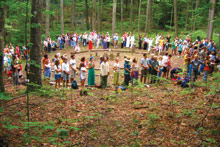Asheville and environs are used to gathering national acclaim: America’s favorite highway. Top 10 greatest places to live. Best place to retire. Home of a world-famous ecovillage?

According to Joshua Canter, co-leader of the Asheville Communities Network and a consultant and educator in intentional-community development, Earthaven in Black Mountain is one of the most famous ecovillages in the United States. But it’s hardly the only intentional community in the area. “There’s a whole bunch that are being founded,” says Canter. “I have a list here of 41 that are in the beginning stages, most of which are in Western North Carolina.” The region also boasts Celo, a long-established Yancey County community, and Westwood CoHousing in West Asheville.
The Global Ecovillage Network defines the ecovillage phenomenon as “urban or rural communities of people who strive to integrate a supportive social environment with a low-impact way of life. To achieve this, they integrate various aspects of ecological design, permaculture, ecological building, green production, alternative energy, community building practices and much more.”
This special brand of intentional community has cropped up in settings as diverse as a working-class Korean/Latino neighborhood in Los Angeles and the mountains of central Mexico, local author Diana Leafe Christian (an Earthaven Ecovillager herself) notes in Finding Community: How to Join an Ecovillage or Intentional Community (New Society Publishers, 2007). And though they can range in size from fewer than 10 members to thousands, the central principles they share are commitments to living gently on the planet and creating a supportive social structure.
Canter, meanwhile, was instrumental in starting True Nature, an ecovillage near the southern Pacific coast of Costa Rica, five years ago. He and his wife, Kristin Luna Ray, live at True Nature half the year, sometimes sharing the space with 20 other community members. “In our society, especially in a place like Asheville, people are taking bits and pieces of their lives and making them more green,” he says. “But when you live in an ecovillage, you’re taking on a full lifestyle. When you live in that environment, everything is sustainability. It’s the focus from when you wake up to when you go to sleep.”
At True Nature, on-site resources such as bamboo and trees provide the building materials, Canter explains. They raise a variety of crops, including bananas, coconuts, citrus fruits, mangoes and avocados. They’ve also set up a nonprofit to aid the locals, via projects such as constructing a community library and offering classes in English. The True Nature Web site features images of people doing yoga, stretching by a waterfall and walking along the beach. But what about the environmental impacts of air travel back and forth to Costa Rica? “That is a concern for us,” says Canter. “We’re definitely having to think more and more about it,” especially with costs rising.
Meanwhile, back in Western North Carolina, the Asheville Communities Network is sponsoring an event titled “Ecovillages: Where They Are, What They’re Doing, Why They’re Important.” It will offer an in-depth look at ecovillages both here and elsewhere. Christian, an international expert in the field, will deliver an hourlong slide show covering everything from natural building practices to conflict resolution. Christian has delivered this presentation in Tokyo, Vancouver, New York City and up and down the West Coast, she says, but it’s a first for Asheville. It will cover “what ecovillages are, essentially, where they’re located around the world, what people are doing in them and how they differ. It’s a chance to see people from all over the world who are doing ecological and sustainable things.”
That includes Christian herself. An author and the editor of Ecovillages, an online newsletter, she travels internationally to educate people about this alternative mode of living. “But in my daily life, I have to watch the TriMetric meter to make sure we’re not using too many loads on our off-grid power system, and I have to haul buckets of compost and deal with the off-grid home-and-utilities lifestyle,” she says. And judging by her enthusiasm for sustainable living, Christian probably wouldn’t have it any other way.
The event is scheduled for Thursday, Sept. 4, from 7 to 9 p.m. at Jubilee! on Wall Street in downtown Asheville. It will also include a performance by singer/songwriter Kristin Luna Ray.



We need more positive alternatives to the rampant insane development that is threatening all of us today. Jefferson, although not perfect, was right to envision small yeoman farmers making up the bulk of the citizenry of America. I do not believe that rationalism and a spiritually healthy lifestyle can be sustainably achieved in a metropolitan environment.